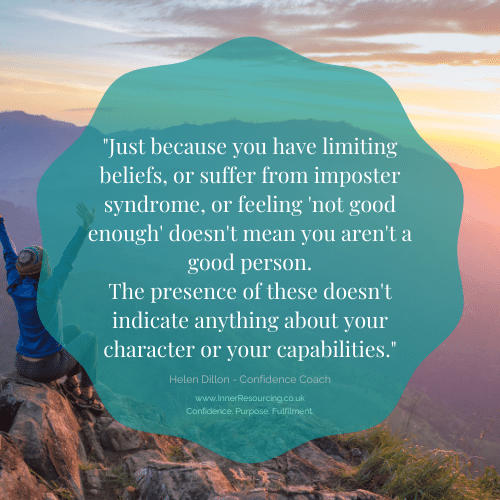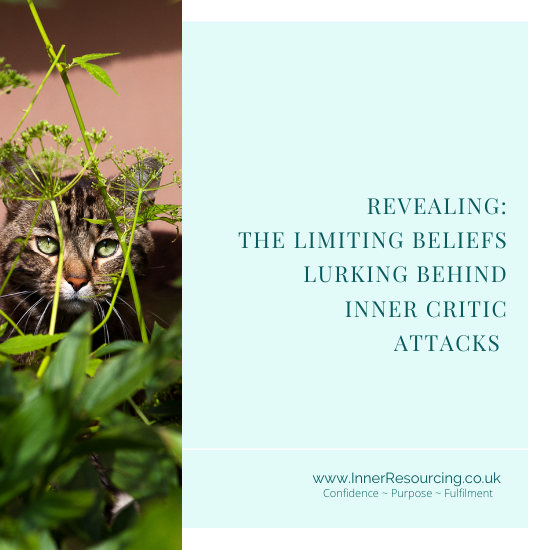Revealing the Limiting Beliefs Lurking Behind Inner Critic Attacks
Do limiting beliefs feel like they’re true?
A client asks: “My inner critic keeps telling me I’m not good enough. I’m trying to stay focused on the knowledge that I AM good enough. But when the negative voices get going, what they say FEELS true, even though I know objectively it’s not. What can I do?“
This is a common experience. Your inner voice says one thing, and your ‘looking-at-this-objectively’ self says the opposite.
This leads to feelings of being conflicted. And stuck.
You’re doing what you’ve been told will help: focusing on the positive and looking at the evidence.
And this does help.
But it’s obviously not the whole answer.
Because the limiting belief of being not good enough doesn’t go away. And the negative voices don’t go away. (Or they don’t go away for long.)
So you flip back and forth between believing “Of course I’m good enough.” And then worrying “..but what if I’m not?”
You wonder “Which is it?”
But, what if …BOTH are true?
The Inner Critic and “the truth”
Let me tell you about something that happened with a little girl I know:
When she was about 4 years old, she was out with her mum one day. As they walked past some parked cars, one of the car alarms went off. This gave her a fright, but worse, she thought she’d caused it. And she was scared she was going to get into trouble.
So much in trouble that in fact the police would arrest her and put her in prison!
As adults we might smile a little at how kids get odd ideas about things. Her mum told her: “Of course the police won’t arrest you. The police don’t arrest little kids. And it wasn’t your fault. And anyway, nobody goes to prison for setting off a car alarm.”
That was true.
But that truth didn’t make her fear any less real. It didn’t make her belief any less true for her.
We know it was based on her 4-year-old’s incomplete knowledge and partial experience of the world.
Yet it felt true, to her.
Partial understanding generates faulty, limiting beliefs.
This is exactly the same as when something in you feels not good enough and something else in you knows you are good enough.
If you think of yourself as a single “I” then this conflict makes no sense and you feel stuck.
However, when you remember that you are a multiplicity of partial selves, each with its own partial view and limited understanding, it begins to make sense.
Something in you feels “not good enough” AND something else in you can point to a load of evidence that you are good enough.
Both are “subjectively” true, but one is based on only partial understanding. And that partial understanding has led it to a faulty belief based on faulty assumptions.
What about the inner critic?
The inner critic is a repetitive pattern of critical thought, voices, and feelings that says “You’re not good enough.“
In fact, as I’ve written about before, the inner critic is really afraid that you might not be good enough. And it’s trying to protect you from what might happen if that were to come true, by repeatedly telling you about it.
Its understanding and knowledge is also incomplete. It doesn’t know, and certainly doesn’t believe, that you’ve really got this. And it’s operating like a stuck record.
Where do limiting beliefs come from?
“Not good enough” isn’t the only limiting belief that shows up.
For example, do you ever feel unworthy, like you don’t deserve to have success and feel happy? And yet, objectively, you know that you do deserve it.
As with the not-good-enough/yes-good-enough disagreement above, this can also feel stuck.
Analysing it, thinking logically about it doesn’t help. That’s because limiting beliefs like these are not mindset issues.
They’re survival issues.
The rules we learn in childhood stay with us
As children, we are driven to seek love and approval, partly because that’s how we build self-esteem. More than that our very survival depends on carers not abandoning us.
We also perceive that love and approval are often conditional on being a certain way. Or on doing or not doing certain things. We learn that we have to earn love. And that love comes with conditions.
However, children don’t have the experience to know that even the most loving parents, teachers, etc make mistakes. And sometimes react out of their own wounded-ness.
As a result we believe what they tell us. And, we try to construct our own guidelines for how to stay safe, be good, be lovable, be worthy, from a limited set of data. These guidelines are our “conditions of worth”.
Conditions of worth become limiting beliefs
They generate limiting beliefs about ourselves, our capabilities, and what’s possible for us.
Often that means:
- behaving in ways that don’t come naturally to us, for example:
- not shoving your baby brother when you want to (Limiting beliefs: e.g. it’s not OK for me to get frustrated. I must take care of others even when I don’t feel like it.)
- smiling when you fall over instead of crying (Limiting beliefs: e.g. I must always be cheerful. I shouldn’t make a fuss.)
And/or
- always trying to match up to some unattainable, often unreasonable, and usually completely undefined, standard of behaviour or achievement (Limiting beliefs: e.g. I’m not good enough. I don’t deserve to celebrate my achievements. The bar for me must always be a little higher.)
As adults we carry these conditions as limiting beliefs and feelings of: “not good enough”, perfectionism, imposter-ism, comparing yourself negatively with others, etc.
Your body knows the score
These beliefs are held in the body, and get tangled in layers owned by different “parts”. “Parts” like the critical part or the unworthy part get split off and stuck in loops. This is because they’re trying to contain the conflicting feelings generated as we try to fit ourselves into a shape that is defined by others.
You might not be able to say exactly why you feel wrong, or anxious, in certain situations, but your body is certainly reacting.
This process happens to everyone to one extent or other. So just because you have limiting beliefs or imposter syndrome doesn’t mean there’s anything wrong with you, or that you’re not a good person.

Limiting beliefs are not encoded logically.
Therefore they can’t be shifted through logical thinking about evidence or objective assessments of how “good” or worthy we actually are.
Importantly, their presence doesn’t indicate anything about our character, or our capabilities.
The child who was worried she was going to be arrested wouldn’t have been helped by her Mum telling her that she was being stupid. Or ignoring her worries because she was being “too sensitive”.
So if you want to dissolve limiting beliefs, and build self-worth and self-belief, you need to go beyond unhelpful notions about being “sensible” or “less sensitive”. And you also need to look further than mindset & logical thinking about who is right and who is wrong.
To overcome limiting beliefs you have to step out of the inner argument
So how do you do this? Here’s a starting place (from the Inner Relationship Focusing process developed by Ann Weiser Cornell and Barbara McGavin):
Instead of “Am I really good enough? Or am I really not good enough? Which is it?”, take a look at the sentence in green below. Try saying it to yourself, slowly, and notice what happens inside:
“Something in me feels “not good enough” AND something else in me is scared that might be true, AND something else in me is pointing to a load of evidence that I am good enough. And I am with all of them.“
The truth is you are not your problems. You are not your self-doubt or your self-criticism. You are not your limiting beliefs.
Nor are you your thoughts, positive or negative. Or your achievements.
The truth is: You are more than all of these.
I have a whole course on dealing with the inner critic, and building self-belief and self-trust. Find out more here: Confidence Rising
For a self-help option, check out my free to download guide “Disarming the Inner Critic” (pdf)
